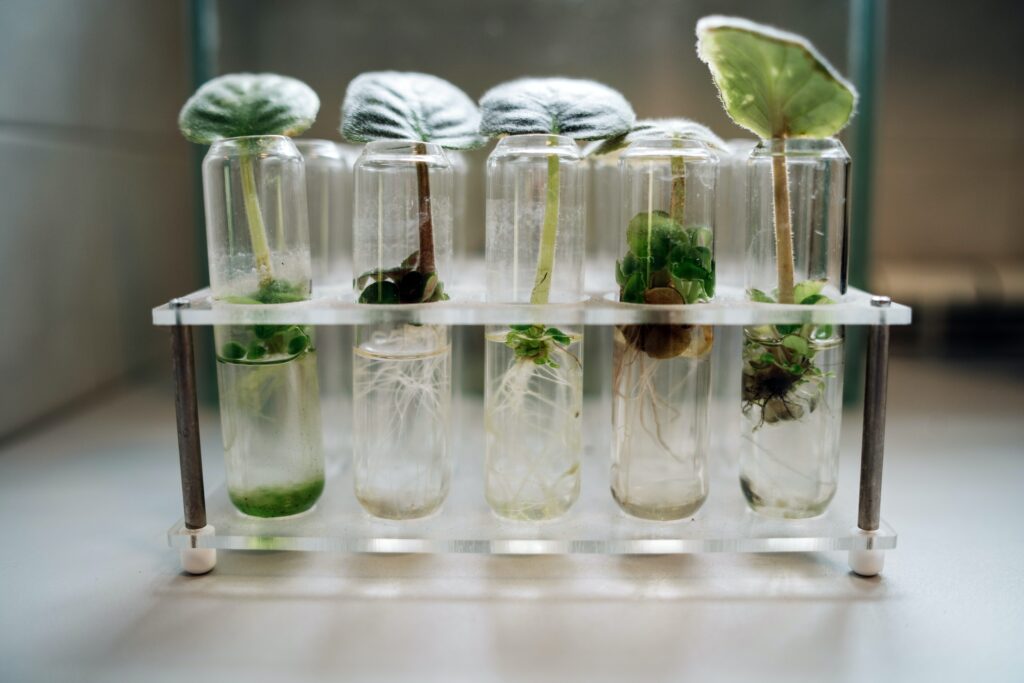From the colorful glass and plastic bottles that populate medicine cabinets to the ingredients used in common and high-end products, the beauty industry’s output and production could be more sustainable, and consumers have been calling for change. Luckily, biotech can help clean up your beauty cabinet in the new year.
More companies are prioritizing eco-friendly packaging, carbon-zero shipping, low water usage in production, and synthetic biology to create ingredients that would otherwise require extractive or invasive means of production.
A new way to do beauty
“The foundational practice of today’s beauty industry is not biology, but in fact chemistry—the study of matter and reactions between substances,” Arcaea CEO Jasmina Aganovic, explained to Town&Country in February 2022.
Yet, the industry is fast learning that biotech has just as much to offer, if not more, when it comes to the sustainable development of products and the growth of companies.

“In the beauty industry, biotechnology is most commonly used to recreate endangered or unsustainable natural ingredients in the lab,” Catherine Gore, president of Biossance, tells Town&Country. “Since there are a limited number of resources available to us, biotechnology provides a solution by creating incredible ingredients without negatively impacting the planet, which is a growing and necessary priority within beauty.”
Additionally, per an article published in Nature in May: “Biotech start-ups see in cosmetics an untapped market with growing opportunities and a low regulatory bar. ‘You can innovate much more quickly,’ says Nick Ouzounov, chief technology officer at Geltor, comparing skincare and cosmetics with the food, fuel, and medicine sectors. ‘The speed to market and the evolution of the market really happen in quarters or maybe a year,’ compared with the decade or more that it often takes to develop other biotech products, he says.”
The colors of the biotech beauty revolution
Biotechnology Innovation Organization (BIO) member, Amyris, has partnered with three major beauty brands (including Biossance) that have attracted big names and tons of praise in the industry.
Amyris uses synthetic biology (synbio) to genetically modify yeast and ferment it with sugarcane to generate sustainable squalane, a replica of the squalene produced naturally by humans (and sharks) and is a skin moisturizer.
This means there is no need to obtain squalene from sharks’ livers, including livers of endangered species.
Amyris’ innovation is an example of blue biotechnology, or a way to synthetically create specifically marine resources. “Marine resources are considered as a novel way to meet the global demand for food, pharma, and energy,” explained a 2019 study. Yet, getting these resources can be hard on marine habitats and life. This has created the impetus for biotech companies to come in and develop synthetic, sustainable alternatives.

There’s also green biotechnology, or innovation that allows companies to negate formerly unsustainable practices (both on land and in the sea) used to develop beauty products.
“Green biotechnology truly is a key pillar of the future,” Mathias Fleury, Givaudan’s global category manager of biotech activities, told Cosmetic Design Europe. “Consumers are looking for more naturality while protecting nature—a difficult challenge made possible by biotech—along with a high level of innovation.”
Similarly, on the perfume front, white biotechnology, using living cells and enzymes to synthesize products that are easily biodegradable, “has emerged in biochemical manufacturing processes to deliver perfumery ingredients satisfying interests of the society for natural, eco-responsible, and sustainable materials,” said a Chemistry Europe article. “As a result, an intense R&D activity has taken place on these subjects, resulting in both scientific publications and patent applications reporting combinations of state-of-the-art approaches in biocatalysis, metabolic engineering, synthetic biology, biosynthesis elucidation, gene edition and cloning, and analytical chemistry.”
A-list innovation
Sustainable beauty has drawn some of the most high-profile celebrities to partner with biotech-friendly beauty companies.
A vocal fan of Biossance’s products, Reese Witherspoon started a five-year beauty deal with the company in 2021 after she got serious about clean beauty. “I’ve been really curious about clean beauty for quite some time, but didn’t do the work and research,” she told PEOPLE.
“I obviously had more time over the past year, and I noticed Biossance at Sephora over the holidays and started using the products. I was blown away by not only how effective they were, but also the sustainability and science built into the brand’s skincare line,” she said.
Rose Inc, another partner using Amyris technology, was recently started by supermodel Rosie Huntington-Whiteley.
“Now that I’m in my thirties and a mom, authenticity, and integrity are so important to me,” she told Elle. “I really wanted the brand to stand for something other than pretty products.” Her brand decided to use Amyris’ sustainable silicone alternative, hemisqualane, as well as sustainable bisabolol, CBG, biosilica, and squalane.
Clean beauty has even broken into the sports sector with former New York Giants defensive end, Michael Strahan, starting his own skincare line, Michael Strahan Daily Defense.
“When I was a player in the NFL, the sweat and helmet affected my skin differently than the harsh lights and makeup from TV cameras for FOX and Good Morning America. Thankfully, the habit of a routine keeps me looking and feeling my best,” he told Popsugar.
He partnered with Evolved by Nature, a biotech company that makes “activated silk” formulations that can replace PFAS, or forever chemicals, among other sustainable compounds. “With new molecules bioharvested from natural renewable resources, we create innovative ingredients that bring the products we love and rely on to the next level of performance, sustainability and better health for all,” the company states.
A growing movement
With the excitement around biotech innovation in the beauty sector coupled with consumer enthusiasm, the path for an industry boom is open—and more and more biotech companies are jumping on the bandwagon.
BIO member companies like Twist Bioscience, Ginkgo Bioworks, and Arcaea, among others, have cooperated and focused a great deal of their work in recent years on sustainable beauty.
In Q3 of 2021, Arcaea announced “a strategic investment and partnership with OLAPLEX—a proven innovator and pioneer in haircare.” The company’s success was facilitated by Ginkgo Bioworks, which “incubated on the Ginkgo platform and formed under the name Kalo Ingredients LLC, was launched with the mission to build a new foundation for the beauty industry through expressive biology.”
“Through Arcaea, we see biology as a creative tool that will drive the next generation of products and innovation. We can now access many more molecules on earth ethically and sustainably, and therefore can unlock unlimited and previously unimagined possibilities for beauty,” said Jasmina Aganovic, a chemical and biological engineering graduate from MIT, and CEO at Arcaea. “By bringing together new advances in technology with designers, brand builders, and leaders from every point of the supply chain, we can spark a change across the entire ecosystem to create an industry that is reflective of the future we want to see for the industry.”
Ginkgo Bioworks also proved to be a leader in biotech beauty. The company partnered with Twist Bioscience back in 2016 to utilize its synthetic DNA technology in the beauty space.
“We’re excited about how quickly they’re scaling their DNA synthesis technology and infrastructure,” Ginkgo told Cosmetics Design. “We’re already tripling our order for next year.”




